Turkey Vacation Destinations
A Mosaic of Culture and History
If you are seeking a destination that offers a perfect blend of culture, history, and relaxation. Look no further than Turkey—a country that straddles two continents: Asia and Europe. From the vibrant cityscapes of Istanbul to the picturesque coastal resorts, Turkey beckons retirees with its rich heritage, stunning landscapes, and warm hospitality.
Culturally, Turkey has a unique blend of influences from both the Middle East and Europe. It has a rich history that spans across various civilizations, including the Byzantine Empire, the Roman Empire, and the Ottoman Empire. This historical background has shaped Turkey's identity, which is a bridge between the East and the West.
Antalya: Where Beaches Meet History:
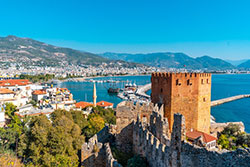
Photo by Oleksandr Pidvalnyi / Pexels | Nestled along the mesmerizing Mediterranean coast, Antalya stands as a captivating beach resort city that effortlessly marries natural beauty with a captivating historical past. Retirees can bask in the warmth of beautiful beaches, swim in crystal-clear waters, and revel in the vibrant nightlife. For culture enthusiasts, exploring the ancient ruins of nearby Aspendos and Perge provide an enriching glimpse into Turkey's storied past. With its picturesque setting and a plethora of activities, Antalya is a perfect destination for retirees seeking relaxation and historical immersion. |
Bodrum: A Serene Coastal Haven:
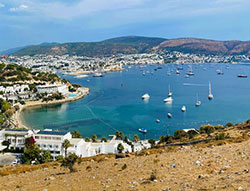
Photo by Arif Sezgin / Pexels | Situated on the enchanting Aegean coast, Bodrum beckons retirees with its idyllic beaches, historical landmarks, and lively nightlife. This resort town offers retirees an array of activities, from leisurely sunbathing to engaging in water sports. A visit to Bodrum Castle is a must, as it showcases impressive artifacts and breathtaking views of the turquoise sea. Immerse yourself in the vibrant atmosphere of the town's bustling markets and savor delicious seafood cuisine. |
| Bodrum is a place where tranquility meets excitement, making it an enticing destination for retirees.
|
Ephesus: Ancient Marvels and Spiritual Significance
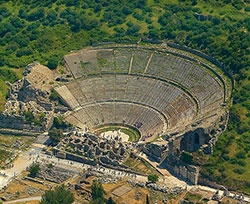
Photo by 12019 / Pixabay | Ephesus, Once a thriving Roman city and a vital center of Christianity, now stands as a captivating UNESCO World Heritage Site that offers a glimpse into the grandeur of the past. Ephesus holds a special place in Christian history, as it was visited by the apostle Paul, who penned his influential letters from within its storied walls. Discover the House of Mary, believed to be where the Virgin Mary resided in her later years. Walk through the ancient ruins and be transported back to a time when Ephesus thrived as a bustling hub of trade and commerce. |
|
Marvel at the grandeur of the Temple of Artemis, one of the Seven Wonders of the Ancient World. Explore the magnificent Library of Celsus, an architectural masterpiece that once housed thousands of scrolls. As you stand in the grand amphitheater, envision the performances and gatherings that once graced its stage. |
Fethiye: Nature's Oasis:
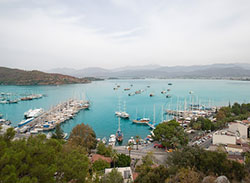
Photo by Furkan Dolunay / Pexels | Nestled on the southwestern Aegean coast, Fethiye boasts not only beautiful beaches but also a captivating natural landscape. Retirees can unwind on stunning stretches of sand, explore hidden coves, and embark on scenic hikes through the nearby mountains. History enthusiasts will delight in discovering the ancient Lycian ruins, such as the striking rock-cut tombs of the Kings of Kaunos. With its perfect blend of natural beauty and historical intrigue, Fethiye offers retirees an escape into nature's oasis.
|
Istanbul: A Tapestry of History and Culture
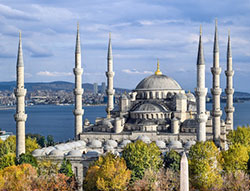
Photo by Nate Hovee / Pexels | Istanbul, the vibrant metropolis bridging two continents, is a captivating blend of history, culture, and modernity. This dynamic city showcases a rich tapestry of architectural wonders, from the iconic Hagia Sophia to the Blue Mosque, each bearing the marks of Byzantine and Ottoman influences. Strolling through the bustling streets, retirees can immerse themselves in the lively atmosphere of the Grand Bazaar, savor the diverse culinary delights, and cruise along the scenic Bosphorus, taking in panoramic views of palaces and landmarks. |
| Istanbul is a treasure trove of heritage, offering retirees an unforgettable experience steeped in centuries of captivating history and the vibrant pulse of contemporary Turkish life.
|
Marmaris: Where Beauty Abounds
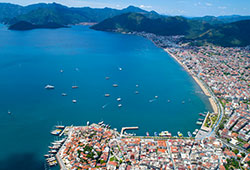
Photo by Yusufozluk / Adobe Stock | Situated along the Aegean coast, Marmaris is a resort town known for its breathtaking beaches, lively entertainment, and historical allure. Retirees can revel in the sun-drenched shores, partake in exhilarating water sports, or simply meander through the vibrant streets lined with shops and cafes. Explore the picturesque Marmaris Castle, which showcases panoramic views of the beautiful harbor and houses an impressive museum. |
| Marmaris offers retirees a captivating blend of relaxation, history, and vibrant nightlife.
|
Pamukkale: Nature's Ivory Sculpture:

Photo by LoggaWiggler / Pixabay | In southwestern Turkey, retirees will find Pamukkale, a town renowned for its striking white travertine terraces. Created by the calcium deposits from thermal springs, these natural wonders resemble a cascading ivory sculpture. Retirees can soak in the thermal waters, indulge in soothing mud baths, and marvel at the ancient ruins of Hierapolis. Pamukkale offers a unique and rejuvenating experience, combining nature's splendor with a touch of history. |
Turkey presents retirees with a plethora of remarkable destinations, each offering a distinct blend of culture, history, and natural beauty. From the sun-kissed beaches of Antalya and Bodrum to the captivating landscapes of Cappadocia and Pamukkale, retirees can embark on a journey through time and immerse themselves in Turkey's rich heritage. Whether it's exploring ancient ruins, savoring delicious cuisine, or simply basking in the warmth of Turkish hospitality, retirees will find their perfect haven in Turkey—a true treasure trove of cultural and historical wonders.
Best Time to Visit:
The best time to visit Turkey depends on the specific regions and activities you have in mind. Here's a general overview of the climate and popular seasons in different parts of the country:
- Coastal Areas (Istanbul, Antalya, Bodrum, etc.): The coastal regions of Turkey enjoy a Mediterranean climate. The peak tourist season is during the summer months (June to August) when temperatures are hot, and the weather is generally dry. Spring (April to May) and autumn (September to October) are also pleasant times to visit, with milder temperatures and fewer crowds.
- Cappadocia and Central Anatolia: Cappadocia experiences hot, dry summers and cold winters. The best time to visit is during spring (April to June) and autumn (September to November) when temperatures are mild, and the landscape is adorned with vibrant colors. Balloon rides are popular in Cappadocia, and early morning flights offer calm winds and stunning views.
- Eastern Anatolia: Eastern Anatolia has a continental climate, with hot summers and cold winters. The region is known for its stunning landscapes, such as Mount Ararat and Lake Van. Summer (June to August) is the most accessible time to visit, with warmer temperatures and open roads. However, be prepared for chilly evenings even during the summer months. For those interested in winter activities like skiing, the ski resorts in Eastern Anatolia are popular from December to March.
- Istanbul: Istanbul experiences mild and relatively wet winters, with occasional snowfall, and warm summers. Spring (April to June) and autumn (September to October) offer pleasant temperatures for exploring the city without the peak summer crowds. Keep in mind that Istanbul is a year-round destination, and each season has its own unique charm.
It's worth noting that Turkey is a diverse country with various microclimates, so it's always a good idea to check specific weather conditions for the regions you plan to visit. Ultimately, the best time to visit Turkey depends on your preferences for weather, activities, and crowd levels.
Travel Planning Tips:
- Visa Requirements: Check the visa requirements for your country of residence before traveling to Turkey. Depending on your nationality, you may need to apply for a visa in advance or obtain an e-Visa online. Make sure to complete the necessary visa procedures ahead of time to avoid any last-minute complications. You can visit the official website of the Republic of Turkey's Ministry of Foreign Affairs or consult with the nearest Turkish embassy or consulate for the most accurate and up-to-date information regarding visa requirements and application procedures.
- Book in Advance: For longer trips or popular routes, it's advisable to book transportation in advance to secure your seats and avoid last-minute inconveniences. Consider booking domestic flights, especially during peak travel seasons, to ensure availability.
- Currency: The official currency of Turkey is the Turkish Lira (TRY). When traveling to Turkey, it's advisable to have some Turkish Lira in cash for smaller expenses, such as local transportation, small vendors, or markets that may not accept credit cards.
You can exchange your currency to Turkish Lira at banks, exchange offices (known as "döviz bürosu" in Turkish), or currency exchange counters at airports. It's recommended to compare exchange rates and fees at different places to get the best deal.
Credit cards are widely accepted in hotels, restaurants, and larger establishments in tourist areas. Visa and Mastercard are the most commonly accepted cards, followed by American Express. However, it's always a good idea to carry some cash as a backup, especially when traveling to more remote or rural areas where card acceptance may be limited.
ATMs (automatic teller machines) are readily available in cities and towns throughout Turkey, and they offer a convenient way to withdraw Turkish Lira using your debit or credit card. Just be mindful of any potential ATM fees that may apply, and notify your bank or card provider of your travel plans to ensure seamless card usage during your trip.
It's worth noting that foreign currencies are generally not accepted for day-to-day transactions in Turkey. It's advisable to exchange your money to Turkish Lira for the most convenient and widely accepted form of payment during your visit.
- Local Customs and Etiquette: Familiarize yourself with Turkish laws, customs, and cultural norms to show respect and avoid any unintentional offenses. Dress modestly, particularly when visiting religious sites, and adhere to any signage or instructions provided.
Transportation:
- Domestic Flights: Domestic flights are a popular and convenient mode of transportation for longer distances in Turkey. Turkish Airlines and other domestic carriers operate frequent flights between major cities and tourist destinations. Domestic flights are generally reliable, time-efficient, and offer a comfortable travel experience.
- Trains:Turkey has an extensive railway network, and trains can be a scenic and leisurely way to explore the country. There are various types of trains, including high-speed trains (YHT), regional trains (Marmaray, Izban, and others), and sleeper trains (Bosphorus Express, Eastern Express). Trains are known for their affordability, comfort, and the opportunity to enjoy picturesque landscapes during the journey.
- Buses: Buses are a popular and cost-effective mode of transportation for both short and long distances in Turkey. There are several bus companies operating intercity routes, offering comfortable seating, air conditioning, and onboard amenities. The bus network is extensive, covering even remote areas, making it a convenient option to reach destinations not served by trains or flights.
- Ferries and Boats: Turkey has a vast coastline and numerous islands, and ferries are commonly used for transportation along coastal areas and to reach islands. Ferry services operate between various ports, providing scenic journeys and connections to popular destinations like Bodrum, Marmaris, and Istanbul's Princes' Islands.
- Taxis: Taxis are widely available in cities and towns throughout Turkey. They are typically metered, and it's advisable to ensure the meter is used or negotiate the fare before starting the journey. Taxis are convenient for shorter trips within urban areas or when public transportation is less accessible.
- Private Transfers or Guided Tours: Consider private transfers or guided tours for more convenience and comfort, especially if you prefer a hassle-free experience or want to explore remote areas where public transportation might be limited.
Overall, domestic flights, trains, and buses are the recommended modes of transportation for traveling within Turkey. They are safe, reliable, and offer efficient connectivity to various regions and cities. Ferries, dolmuş, and taxis are additional options that provide flexibility and convenience for specific travel needs within urban areas or coastal regions.
Safety Tips:
- Stay Informed: Stay updated on the latest travel advisories and guidelines issued by your government and the Turkish authorities. Be aware of any potential safety concerns or regions to avoid and plan your itinerary accordingly.
- Personal Belongings: Take necessary precautions to safeguard your personal belongings. Be cautious in crowded areas, public transportation, and tourist hotspots, and use secure bags or money belts to minimize the risk of theft or pickpocketing.
- Emergency Contacts: Keep a list of emergency contact numbers, including local authorities, your embassy or consulate, and your accommodation. Familiarize yourself with the nearest hospitals or medical facilities in case of any emergencies.
- Health and Safety Precautions: Prioritize your health and safety by carrying necessary medications, using sunscreen, staying hydrated, and following basic hygiene practices. Consult your healthcare provider or a travel clinic for any recommended vaccinations or health precautions..
- Health Concerns: Stay informed about potential health risks and consider necessary vaccinations before traveling. Carry a basic first aid kit with essential medications.
- Travel Insurance: Obtain comprehensive travel insurance that covers medical expenses, trip cancellations, and personal belongings. Ensure your insurance policy is valid for the duration of your trip and provides sufficient coverage.
- Respect Local Laws and Customs: Familiarize yourself with Turkish laws, customs, and cultural norms to show respect and avoid any unintentional offenses. Dress modestly, particularly when visiting religious sites, and adhere to any signage or instructions provided.
- Travel Advisories Stay updated on current events, local regulations, and any travel advisories when traveling abroad. Visit the US Government State Department Travel Advisories web site to check on the status of your destination.
- Enroll in the STEP Program: Travelers are also urged to enroll in the U.S. State Department's Smart Traveler Enrollment Program (STEP) to receive security messages and to make it easier to locate them in an emergency. The Department uses these security messages to convey information about terrorist threats, security incidents, planned demonstrations, natural disasters, etc. In an emergency, please contact the nearest U.S. Embassy or consulate or call the following numbers: 1 (888) 407-4747 (toll-free in the United States and Canada) or 1 (202) 501-4444 from other countries.
| |
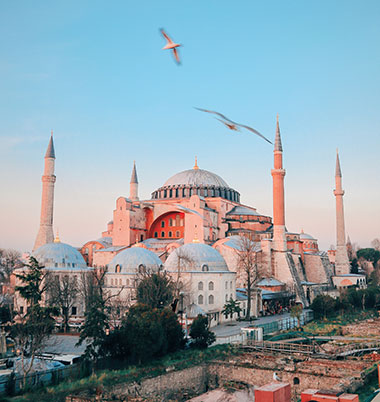 Hagia Sophia, Istanbul
Photo by Yunus Tuğ
 Interior, Hagia Sophia
Photo by Serkan Bayraktar
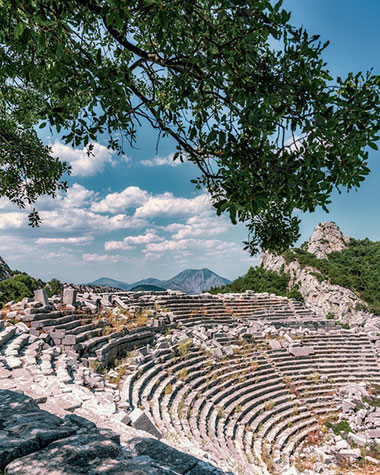 Termessos Theater, Antalya
Photo by Egemen Dagistanli
 Istanbul, Turkey
Photo by Yunus Tuğ
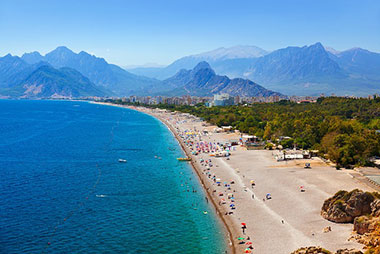 Bodrum coastline, Turkey
Photo by Ender Boz
|
 Hagia Sophia, Istanbul
Hagia Sophia, Istanbul Interior, Hagia Sophia
Interior, Hagia Sophia Termessos Theater, Antalya
Termessos Theater, Antalya Istanbul, Turkey
Istanbul, Turkey Bodrum coastline, Turkey
Bodrum coastline, Turkey